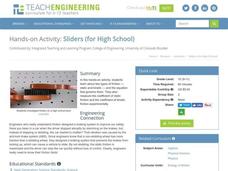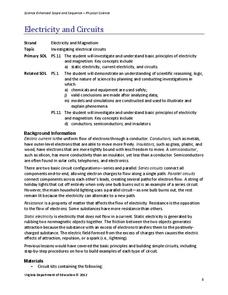CK-12 Foundation
Loop-the-Loop
What prevents a roller coaster from falling when it goes upside down? Scholars experiment with a roller coaster simulation controlling the mass of the coaster, the height of the hill, and the radius of the loop. They learn which factors...
CK-12 Foundation
Malt Shop
How does the soda clerk know exactly how to get the glass across the counter to the customer? Pupils use the simulation to adjust the launch velocity, glass weight, base area, surface material, and the customer's position to answer that...
CK-12 Foundation
Hotpack - Coldpack
Chemistry can help athletes and others protect and treat injuries. Use the interactive activity to explore the chemical reactions in instant hot and coldpacks. Learners manipulate the type of salt in the pack and watch the reaction take...
Teach Engineering
Building a Piezoelectric Generator
In pairs, learners build a piezoelectric generator from readily available electric components in the second and final installment of the two-part series. Tapping the piezoelectric element produces enough electricity to light an LED....
PHET
Double Wells and Covalent Bonds
Quantum tunneling plays an important role in nuclear fusion, the energy source of the sun. This simulation explores tunneling, double wells, and covalent bonds by allowing individuals to manipulate potential and total energy to learn...
Teach Engineering
Energy and the Pogo Stick
Let your class bounce to examine the concept elastic potential energy. Individuals bounce on a pogo stick in order to calculate its elastic potential energy. Groups then compare the elastic potential energy to the gravitational potential...
Teach Engineering
Pushing it Off a Cliff
Focus on the conservation of energy, specifically looking at gravitational potential energy and kinetic energy, with a lecture that involves having friends throw light objects at each other to determine which has more kinetic energy and...
Teach Engineering
It's Tiggerific!
Spring into elastic potential energy with a lesson that provides background information on determining the elastic potential energy of springs and other elastic materials. General energy equations emphasize the conservation of energy and...
Teach Engineering
Sliders (for High School)
Slip sliding away. Groups investigates the two types of friction by running an experiment that allows them to calculate the coefficient of static friction and the coefficient of kinetic friction. The experiment uses a box, a basket, and...
Teach Engineering
A Shot Under Pressure
You've got to pump it up! Using the equations for projectile motion and Bernoulli's Principle, class members calculate the water pressure in a water gun. The pupils collect data on the number of pumps and distance traveled in order to...
Teach Engineering
Ramp and Review (for High School)
Rolling for momentum. As part of a study of mechanical energy, momentum, and friction, class members experiment rolling a ball down an incline and having it collide with a cup. Groups take multiple measurements and perform several...
Bowels Physics
Work, Energy, and Power
Work, energy, and their relationship to power: what is the common thread? Explore this with your class as they learn the concepts of work and energy, both kinetic and potential, before completing multiple practice problems to demonstrate...
NASA
Feel the Heat
Pupils examine how solar energy can supply power and heat on the lunar surface. As groups design and build a solar-powered water heating system, they test their system to determine the change in temperature of the water and redesign it...
NASA
Roving on the Moon
Take a rover out for a test drive. The challenge is to build a rubber-band-powered rover out of cardboard. Individuals or groups work at making modifications to a prototype rover to increase its efficiency.
Teach Engineering
Swinging Pendulum
Get into the swing of things. Pupils use a pendulum to demonstrate the conversion of potential energy to kinetic energy and back. After measuring the speed of a pendulum and compare it to the calculated theoretical speed, they determine...
Virginia Department of Education
Electricity and Magnetism
Take charge of your class and provide them with an electrical experience! Individuals investigate the basic principles of electricity and magnetism by creating a model to test electric current and the amount of electricity generated....
Virginia Department of Education
Electricity and Circuits
Electrify your classroom as you lead pupils through a series of steps to demonstrate basic principles of electricity and magnetism. They design a simple circuit and test this for static electricity and current electricity. Next, they...
It's About Time
Exploring Energy Resource Concepts
Please turn off the lights to conserve energy. Or not, after all energy is always conserved. This first lesson in an eight-part series includes three parts. Part A contains one hands-on activity and two inquiry-based experiments on heat...
Wind Wise Education
What is the Cost of Inefficiency?
What does it cost to keep the lights on? Through a hands-on activity, class members use a watt meter and determine the amount of energy different types of light bulbs use. The class then determines the financial and environmental cost of...
Virginia Department of Education
The Law of Conservation of Matter
The Law of Conservation of Matter can be complex for young scientists to fully grasp. Use this experiment to help simplify the process as pupils perform two experiments to determine mass: one that melts a substance and the other that...
Virginia Department of Education
States and Forms of Energy
Energy is just energy, right? Explain various forms of energy to your young scientists by using an interactive experiment that contains common objects to demonstrate complex concepts. Pupils conduct experiments for radiant, thermal,...
Virginia Department of Education
The Modern Model of Atomic Structure
The difference between atomic mass and atomic number can be confusing for some young chemists. Help your class better understand the concepts by allowing them to sketch an atom on paper and then discuss their experience. Upon completion...
Virginia Department of Education
Historical Models of Atoms
What does the past have to do with today? Young scientists find that answer as they learn more about past chemists and their significant contributions to the field. Pupils use the Internet to research historical figures and create a...
Teach Engineering
Can You Resist This?
Some things are hard to resist. Small collaborative groups build circuits and calculate the voltage using Ohm's Law. Budding engineers explore the connection between the voltage across different resistors and linear functions with...

























